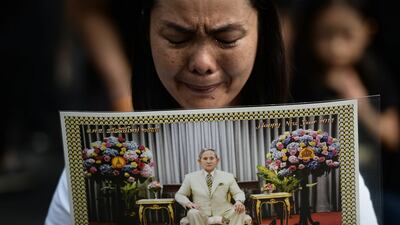Two days on, the government says it has provided medical treatment to scores of people overcome by grief and paid on a hotline mourners can call to help them through the trauma.
“There are people who hyperventilate and we try to calm them down by talking to them,” Boonruang Triruangworawat, director general of the department of mental health said on Saturday. “Others we have to send to hospital.”
Thousands of black-clad mourners gathered at the Grand Palace on Saturday, a glittering complex of halls, pavilions and gardens where the remains of the king will lie for months before a royal cremation, although his body will not be put on view for another 15 days.
Some held umbrellas against the sun, and others fanned themselves, visibly overcome by grief.
Dotted around the riverside palace were dozens of ambulances and medical tents. Teams handed out cotton wool soaked in ammonia solution to help revive anyone close to fainting.
Mr Boonruang said about 200 people had been treated by medics since the king died, some for hyperventilation because of anxiety.
Thais loved King Bhumibol as a father figure, and the death of the world’s longest-reigning monarch after 70 years has left many uncertain about the future.
One of those being treated at the palace, Suchin Yamatad, 64, said he felt dizzy at the news of the king’s death.
“It’s just that I’m old. I’ve seen his majesty for a long time,” he said.
There was a government webpage to advise people how to cope with grief, as well as a counselling hotline, the ministry of public health said.
Most of Thailand is grieving quietly but in some regions, the king’s death has made tempers fray. About 400 people gathered outside the home of a soya milk vendor in the southern province of Phuket on Friday and threatened the vendor’s son after he posted comments on Facebook that they regarded as insulting to the king. Video footage shows the crowd outside the shop waving placards with slurs such as “buffalo,” a local slang word for stupidity, and yelling for the man to come out.
One man shouted, “If you don’t love the king, who else would you love in this land?”
“The messages aren’t necessarily aggressive, but they hurt the feelings of Thai people who are grieving,” said Teerapon Tipcharoen, the Phuket provincial police commander in charge of the case.
The vendor’s son could be charged with breaking Thailand’s royal defamation and computer crimes law, he said.
The Thai government has decreed a year of mourning, during which Thais are encouraged to wear black, the colour of mourning, or other dark colours, or white, the colour of purity. But traders have been warned not to take advantage of the demand for black and white clothing.
“Regarding black shirts which have become more expensive, the commerce ministry has sent teams to inspect white and black clothing vendors to make sure the shirts are not being sold at prices that are too expensive,” said Major General Sansern Kaewkamnerd, a spokesman for the prime minister’s office.
Traders said business was brisk and denied pushing up prices.
Street vendor Songkhan Tansonan who has stall next to a fetid canal outside Bangkok’s Bobae Market said she had so9ld 200 black shirts by midday on Saturday and 400 the previous day, selling them with a 50 per cent mark-up.
.Nongrak Bantaotuk, a nurse, said she was buying black shirts for herself and her family. “If you compare, the price is higher than before, but this isn’t about prices,” she said. “We’re going to wear them for a year.”
Concerts and beach parties have been cancelled. Nor will the annual festival take place for the goddess of water in which lanterns are sent floating into the sky.
Not even past military coups succeeded in shutting Bangkok’s irrepressible red-light district. But they are closed now.
The death of the king who reigned over Thailand for 70 years has undoubtedly plunged the country into an unprecedented emotional state. But calm — not chaos — prevails, and the closures and cancellations are unlikely to last more than a month or have any serious long-term effect on tourism.
Prime minister Prayuth Chan-ocha has declared a one-year mourning period and urged people to refrain from organising entertainment events for 30 days. But he has also made clear that life must go on, and urged businesses to remain open to ensure the nation does not “lose its credibility.”
More than 30 million tourists visit Thailand every year, accounting for about 10 per cent of government revenue and the Tourism Authority of Thailand confirmed that tourist attractions will remain open with the exception of Bangkok’s gilded Grand Palace, because it “will be the venue of the royal funeral rites.” No foreign government has suggested its nationals to cancel trip plans, but several have issued advisories. Canada called on its citizens to “refrain from any behaviour that may be interpreted as festive, disrespectful or disorderly,” Britain urged its nationals to “wear sombre and respectful clothing when in public,” and the US. called on Americans to maintain “decorum during this extended period of profound mourning.”
*Agencies

